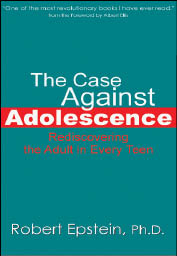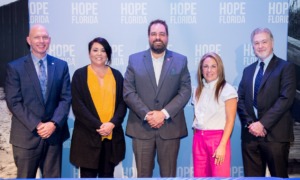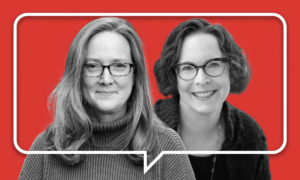 |
By Robert Epstein
Quill Driver Books, March 2007
450 pages, $24.95
“Adolescence” is a bonanza for youth programming. Without America’s doctrine that we must expend vast resources – including policing, education, counseling, mentoring, treatment and incarceration – to stop adolescents from acting like adults, most prevention programs as we know them would not exist.
If psychologist Robert Epstein gets his way, things will change. He argues that the notion of adolescence as a separate, tumultuous life stage harms young people, as well as society, and should be abolished. The passion and credentials of this former Psychology Today editor, along with the evidence he’s amassed, make this powerful and sometimes radical book a crucial counterforce to America’s youth-bashers.
Epstein says that historically, the “extension of childhood” has served an array of labor, educational, social entrepreneur and political agendas at the expense of trapping teenagers in peer cultures apart from adults. Americans misperceive teenagers as brainless, immature risk-takers, not because they are, but because our culture’s suppression of precocity makes them appear so.
The author finds that 13- to 17-year-olds score as maturely (or immaturely) as adults do on his “adult competency” and “infantilization” tests, even though American teens suffer more legal restrictions than soldiers and imprisoned felons. His list of dozens of legal and social curbs on teens (curbs that grow by the year) is evidence of an American culture dedicated to “infantilizing teens” more than any other society.
“I’m embarrassed by my fellow scientists,” he says of the latest rhetoric disparaging adolescent brains as undeveloped and reckless. The handful of neuroscientists who label teens mentally incompetent not only grossly exaggerate dubious brain activity imagings, but confuse cause and effect. “Brain [activities] are reflections of our behavioral, cognitive, and emotional states; they don’t cause these states,” Epstein declares. “No brain is fully developed. Brains change throughout the life span.”
Mostly for the worse. “We are most able to reason clearly in our teens,” Epstein argues. “Teens are highly capable decision-makers – perhaps, on average, more capable than adults.”
Adolescents are tough and creative, distinguishing themselves throughout history with innovations in science, the arts and other grownup endeavors. The lessons of history and of teen-friendlier cultures today, in which respect for youths fosters fewer troubles and positive social contributions, expose America’s disastrous myths of adolescence.
Epstein would abolish the legal and social concept of adolescence, replacing blanket restrictions on adolescents’ rights to vote, drink, sign contracts and exercise other adult rights with a system of emancipation based on “competency tests.” If psychometric tests are valid enough to evaluate and lock up teenagers, they’re valid enough to grant them rights.
The author anticipates opposition from those he brands “enemies of the teen”: entities from government, business, religion, the media, juvenile justice, law enforcement, mental health, education, politics and various programs that “infantilize young people, discourage integration of young people into adult society, and encourage censorship.”
Those enemies range from the American Psychological Association and juvenile courts to Hilary Clinton, Dr. Laura Schlessinger, the Partnership for a Drug-Free America, and major news networks that profit from “misportraying youth.” In other words, just about everyone who’s important.
Unfortunately, Epstein the visionary scholar, who boldly advocates adolescent rights, differs sharply from Epstein the chronicler of modern youth. “Because they’ve been treated like children and isolated from adults …,” he declares, teens are “out of control,” “highly troubled,” “immersed in a vacuous teen world,” “overly dependent on drugs and alcohol,” “unnecessarily careless about sex,” “excessively violent, angry, moody, and depressed” – and their “problems are worsening.”
Hogwash. When will Epstein and other Ph.D. authors quit copying media myths and dubious website claims, stop using scare tactics to promote their goals, and get basic facts about youth right?
As evidence of “turmoil in today’s teens,” Epstein cites a website to declare that “between 1996 and 2003, 147 students and 11 staff members were killed or wounded in 28 separate shooting incidents in United States schools.” During that same period, he fails to note, 280,629 Americans died from shootings. Even amid the nation’s ongoing national gun carnage, our schools remain safer than Denmark.
Because studies show teens are as adept as middle-agers at gauging risks, Epstein asks, “Why do they [teens] take them?” Has he checked major risk indexes? Compared with 16-year-olds, adults Epstein’s age (54) suffer 45 percent more violent deaths, 30 percent more gun deaths, 35 percent more fatal accidents, 2.5 times more suicides, and eight times more fatalities from use of illegal drugs.
That’s right: Teens are acting better today, even as older Americans are out of control. So why does Epstein lament that modern “teens tend to imitate each other, not adults”?
The Case Against Adolescence also grossly misrepresents our e-mail exchange on the pivotal effect of poverty on teenage dangers. Epstein seems unable to comprehend that forcing crippling poverty on millions of teens is America’s worst anti-youth discrimination, linked to far worse teen problems than the cultural forces he blames.
How can Epstein propose more respectful treatment of adolescents when he demeans a diverse generation of 30 million with shallow stereotypes? Inadvertently, he reveals two more great reasons that teenagers should have more power: to prevent writers from writing gratuitous crap about them, and to improve adults’ personal behaviors, policies and science by making it politically dangerous to scapegoat adolescents for grownup failings.
Regrettably, however, Epstein’s strategy to promote youth emancipation makes political sense. My alternative argument – that teens’ healthier behaviors, even under duress, demonstrate adolescent competence and make a far better case for expanding teen rights than Epstein’s manufactured crises – has gotten nowhere. Sadly, when it comes to youth, Americans only respond to fear.
The fact is that America’s social and health policies, including youth policies, don’t work. We lag decades behind other Western nations in effectively addressing perilous problems afflicting all ages.
Epstein presents a persuasive, marketable plan to rescue youth programs from their endless, futile mandate to suppress adolescent precocity, and American social policy from the perpetual ineptitude of blaming teens for social problems caused by adults. Imagine how much more free and focused youth programs will become once “teen pregnancy,” “youth violence,” “underage drinking” and other obsolete clichés are sent to the landfill, and teen and adult issues can be addressed as an integrated whole.






























